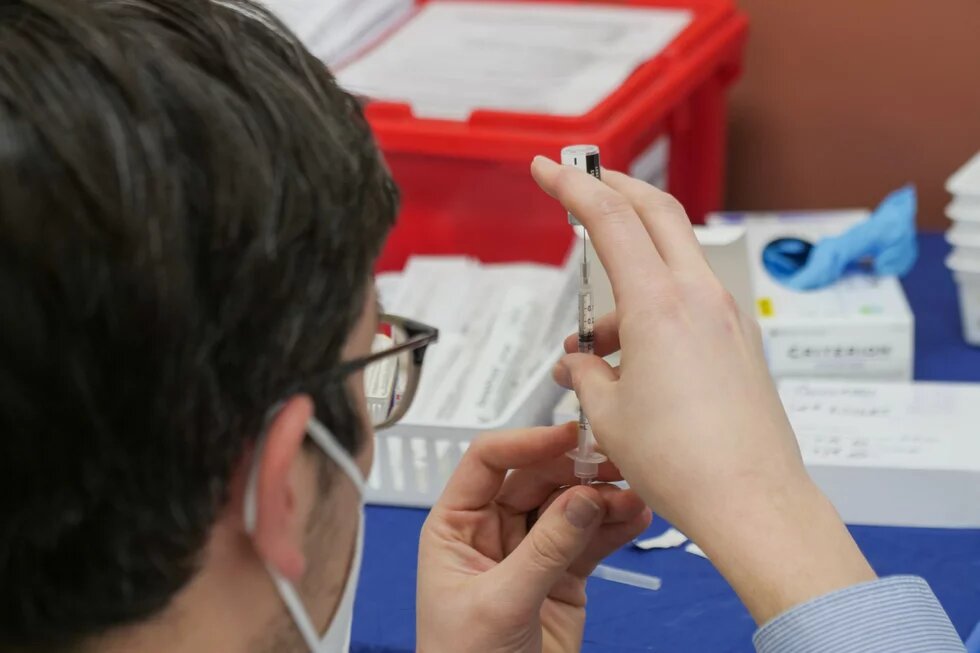Amidst the Covid-19 pandemic, the government-sponsored disinformation engine is operating at full capacity in Hungary, scapegoating and intimidating critical voices and triggering death threats against academics and intellectuals.

In the cacophony of information about the available, authorized, or emerging COVID-19 vaccines, including issues of liability for potential side effects and the long-term consequences of the shots, as well as the length of the immunity conferred, the European Commission has been struggling to procure sufficient COVID-19 vaccine supplies for its member states. So far, the European Medicines Agency (EMA) has authorised the use of three vaccines: Comirnaty (Pfizer/BioNTech), AstraZeneca and Moderna. Meanwhile, Hungary’s government has set off on its own path, turning to Russia and China for additional help, as vaccine delivery through the EU is slow due to both its robust regulatory framework and ordering issues.
By doing so, Hungary has followed the example of Serbia, which currently has the highest vaccination rate in continental Europe. Serbia adopted an omnivorous approach to inoculation, in spite of the many open questions about the safety and efficacy of the eastern vaccines.
To cover up their own procurement difficulties, their controversial communication about the vaccination plan, and the subsequent confusion, the Orbán regime and their loyal journalists have not refrained from spreading egregious disinformation, even conducting a witch-hunt to silence critical voices. It is essential for Orbán, in power since 2010 and now gearing up for the elections in 2022, to maintain his image as a paternalistic, strong leader who alone will save his people from their enemies, imaginary or real. The danger is, as pointed out by recent Hungarian and international studies mapping vaccine confidence, that politicising the rollout of the jab will weaken trust in vaccination itself.
Just like in many other countries worldwide, there are many open questions and issues about the Hungarian vaccination strategy, including whether or not individuals can choose the type of jab received, the issue of obligatory registration involving unnecessary paperwork, and a general lack of trust in the process and the vaccines themselves.
Witch-hunt against critical voices
In early 2021, Péter Krekó, the executive director of the think tank Political Capital, received death threats against himself and his family after a comment he made was quoted in a POLITICO Europe article about Hungarian vaccination policy and deliberately misinterpreted by pro-government media outlets and government members. The article criticized Hungary’s prime minister for “trying to score points with Russian President Vladimir Putin by pushing the use of the Sputnik vaccine”. Yet, as stated by Krekó, “the […] promise to apply and license Sputnik V quickly is … not only unfounded, but could also undermine the general confidence in vaccination.”
According to a survey by the Hungarian Central Statistical Office, it is the safety and efficacy of the shot that impacts attitudes toward vaccination the most, rendering political manoeuvring counterproductive in an environment where, according to polls, vaccination willingness plunged to 15% by December from 55% last August. It gradually increased to 38% by February 2021 following the launch of the vaccination campaign.
Low trust in Chinese and Russian jabs
However, trust in Chinese and Russian shots still remains very low; only 1 or 2% of the Hungarians questioned would accept them, according to a mid-January survey by Pulzus. An international YouGov poll published by Reuters in the same period also indicated distrust towards these vaccines, as opposed to those developed in Germany or the United States.
The low trust rate is most likely due to the insufficient information available about the development and possible side-effects of these jabs. Their laboratories, the Russian Gamaleya Institute and China’s Sinopharm and Sinovac Biotech have not yet published full sets of trial data, making it impossible for scientists to accurately compare them to their western counterparts.
Pro-government fake-news factory
It is in this context that POLITICO Europe cited Péter Krekó: “The stakes are pretty high […] If you undermine the willingness of people to vaccinate themselves, [Orbán] can suffer the political consequences.” Although the word ‘you’ in his statement refers to the country’s leader, pro-government media outlets took the sentence out of context and claimed it was addressing the opposition. In a vociferous crusade of ire, they scathingly called Krekó’s statement a ‘death campaign’ that was allegedly encouraging the opposition to undermine confidence in vaccines and thus sacrifice citizens’ lives - just to regain power.
Orbán labels criticism evil
Prominent journalist Zsolt Bayer, cofounder of the governing FIDESZ party, even launched a petition inciting the public against both Krekó and the left. Prime Minister Orbán also spent airtime on labelling the political analyst’s statement as “evil” in his weekly radio interview on 3 January.
The witch-hunt prompted widespread academic support for Krekó: More than a hundred leading academics from the US and Europe expressed solidarity with the “accomplished scholar”.
Academic research about conspiracy theories
Krekó and his co-authors have defined fake news “as fabricated ‘information,’ which is deliberately created to misinform readers [… and] often mimics news media content […] in its appearance”, publishing a research paper on the phenomenon in 2018. Alternative truths and conspiracy theories belong among Krekó’s main fields of research and were also discussed in his book entitled Mass Paranoia, also published in 2018. In a Eurozine article he claimed that the drive to disinform has emerged from a tribal mindset creating myths and “weaponized information against other perceived tribes” that outweigh reality in the eyes of those who identify as belonging to a tribe.
According to the Eurozine article, this involves “defeating my opponent through any means, while putting my trust in the leader of my tribe”. Disinformation, Krekó adds, “often provides raw material for such myths, which are then used to justify transgressive political acts and mobilize likeminded tribalists against their perceived shared enemy […], spreading fake news for domestic political gains.” The problem is that tribalism is incompatible with democratic pluralism.
Scapegoating – a sophisticated means of intimidation
What is now happening to Krekó perfectly fits into what he has described as Orbán’s paranoid political universe, in which everything is explained by conspiracy theories and scapegoating, such as the billboard campaigns that transformed the philanthropist billionaire George Soros, migrants from outside of Europe, and “Brussels” into folk devils. “Even if the amount of vaccine doses administered so far in Hungary is not bad in international comparison, the government is scared about the situation,” Krekó has told this author. By misleadingly announcing the opposition’s ‘death campaign’, the pro-government media are casting them responsible for whatever may go wrong with the rollout of the vaccination itself, including potential future side effects.
“This is a more sophisticated scare tactic than in an autocracy,” Krekó told this author. “You can turn anyone who utters any critical remark into the common enemy, call him the voice of the opposition, and thus destroy his image as an expert.” Such a climate induces self-censorship and fear, evoking disquieting times from our history, and is particularly harmful in a period when people need expert, reliable knowledge to reassure them about the vaccines.
These developments will indeed narrow down the battlefield leading up to next year’s elections and hence serve the government’s interests. Public health restrictions, lockdowns and curfews already make any kind of physical citizen action impossible – a state that may well remain so in the autumn of 2021, extremely limiting the moves that might be made by the scattered opposition.
Depriving the licensing body of its competence
On 20 January, the National Institute of Pharmacy and Nutrition (OGYÉI) granted a six-month authorization for the emergency use of the Russian Sputnik V and Chinese Sinopharm vaccines, without publishing related documents about the products’ characteristics, leaving members of the Hungarian Medical Chamber baffled.
Dr Ferenc Falus, former Chief Medical Officer, explained that the licensing body was put under pressure by the government to speed up approval processes and was finally deprived of its competence by a government decree published 28 January, which he thought was scandalous.
Kata Nehéz-Posony, a lawyer, told television station ATV that the decree obliged the licensing body to approve a vaccine under the fulfillment of certain conditions, namely, if Foreign Minister Péter Szíjjártó confirms the vaccine has already been injected into more than one million people in three different countries, one of which is an EU Member State or candidate country. This condition is tailor-made for the direct approval of China’s Sinopharm, for which Orbán had been pushing. According to Nehéz-Posony, “This is highly problematic, as the acknowledgement criteria are unclear. It implies that the institute may have to rely on decisions made by medical authorities in Kyrgyzstan, Azerbaijan and Serbia, without being able to verify the information.”
After the ‘authorization’ of the licensing body, vaccine batches still must be analyzed by another organization, the National Public Health Centre, which leaves hope that patients’ safety will still be guaranteed.
“However, the decree undermines trust in the approval process and reduces the licensing authority to an administrative body,” Dr Falus said. “Who is liable if a patient reports a problem related to the shot? The manufacturer? The authorizing body? The country of administration? These are the questions that need clarification in order to raise general trust in vaccines.” The same question holds for a vaccination certificate. “Since we do not know the length of immunisation, and inoculation efficacy is not 100%, how do I know that I am not part of the 5% where the vaccine was inefficient?” Dr Falus asked rhetorically.
Public spat about the Russian vaccine’s application for EMA approval
A recent study about Sputnik V published 2 February in The Lancet, a top medical journal, is promising with regard to its efficacy, which appears to be over 90%, according to preliminary results of a phase 3 clinical trial. However, the European Medicines Agency and the creators of the Russian vaccine give different accounts about the status of the approval application, with the latter alleging they had already filed for EMA approval. In response, the EMA published a clarification on 10 February, affirming that “The European Medicines Agency has to date not received an application for a rolling review or a marketing authorization for the vaccine […], despite reports stating the opposite.”
That disagreement will not affect Hungarian patients, though, as Orbán did not wait for the EMA approval, and the first Russian coronavirus jabs were administered in Budapest beginning on 11 February to elderly people, leaving him satisfied. In his Friday morning interview on February 12th, he asked his audience: “Why would we think that Europeans are cleverer than us? This is a hypothesis. I do not trust experts in Brussels more than our Hungarian ones. We need to trust ourselves.”
This articles was first published by the Heinrich-Böll-Stiftung Prague office.


